
 |
|
|
 THE ANNIVERSARY OF THE LIBERATION OF THE ABBEY OF JOUARRE, August 27, 2024
THE ANNIVERSARY OF THE LIBERATION OF THE ABBEY OF JOUARRE, August 27, 2024CASTA LIBERTAS: A REFLECTION ON FREEDOM OFFERED BY MOTHER JOHN MARY 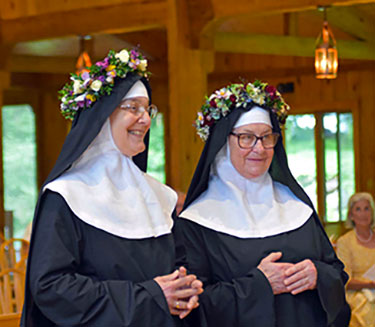 Consecration Ceremony August 17, 2024 I’ve been reflecting on this ceremony in light of another ceremony we had just 10 days ago, the ceremony of Consecration to a life of Virginity, in which two of our community—Mother Alma and Mother Esther – were consecrated by the Church into a spousal union with Christ. There is a very beautiful and long Consecration Prayer in which there is a phrase—just two words—that I kept reflecting on. The whole sentence reads “Let there be in her, O Lord, through the gift of your Spirit, prudent modesty, wise tenderness, grave sweetness and chaste liberty”, but it’s that chaste liberty—in Latin casta libertas that has stayed with me. I love the phrase—it sounds a bit like a rallying cry for a revolution (“what do we want?” “Casta Libertas!”). It is such a bold thing to say: “chaste freedom”, or “the freedom of chastity”, and so counter cultural to our way of thinking—doesn’t chastity mean rather a denial or deprivation? It seems like a strange paradox. So in light of that libertas, the word for today’s ceremony—liberation, caught my eye, and I wondered if this was just a verbal coincidence, or whether there might be any meaning we could draw from the two ceremonies in sequence? Sometimes we rush on to the next thing and don’t have time to think about how the last thing might relate to the next. So, I took a moment to revisit the story we know so well about Lady Abbess and the Liberation of Jouarre to see it afresh with this in mind, and I’d like to share a few thoughts I had. 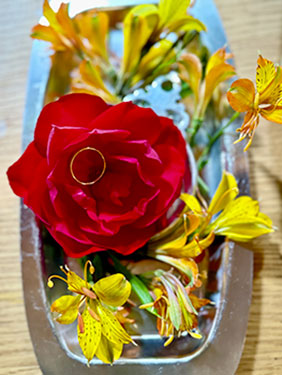 I was struck in the rereading by something that Lady Abbess’s community did right at the beginning of the German invasion in 1939. In May, the Germans had easily plowed through the French lines and totally defeated the French army—the worst had happened, and the nuns were staring into an abyss of occupation and terror with no end in sight—there was no set date for the Liberation that we have in hindsight. By June Mother Benedict and the nuns of Jouarre watched helplessly as the French soldiers retreated in shock and despair. The German army was now rapidly advancing towards Jouarre itself, and they could actually hear the bombs not far away as they approached. The danger was imminent and the nuns were ordered to leave the monastery immediately without delay. But there was one small problem: the Consecration ceremony for one of the nuns, whose name was Mother Telchilde (a precursor to our own) was due to take place the next day. This Benedictine community of nuns felt there was only one choice to make—and so they went ahead with the ceremony next day in the midst of the bombs, which as Lady Abbess’ book says, they could hear exploding regularly during the ceremony. With the consecration complete, they departed. “At that moment, writes Lady Abbess with incredible imperturbability, “the Community was complete, but uncertainty lay ahead”. To me, that serene state expresses something of the casta libertas of the Consecrated life itself: a real, interior liberation that she had long before the actual Liberation. It was a freedom of faith, a fearlessness to put first things first—truly they had followed St. Benedict’s precept: “To put nothing before the love of Christ”. Surely too, Mother Maria Aline, our co-foundress, must have drawn on her consecration to give her the fearlessness she needed to face down the Nazi Gestapo. I was struck in the rereading by something that Lady Abbess’s community did right at the beginning of the German invasion in 1939. In May, the Germans had easily plowed through the French lines and totally defeated the French army—the worst had happened, and the nuns were staring into an abyss of occupation and terror with no end in sight—there was no set date for the Liberation that we have in hindsight. By June Mother Benedict and the nuns of Jouarre watched helplessly as the French soldiers retreated in shock and despair. The German army was now rapidly advancing towards Jouarre itself, and they could actually hear the bombs not far away as they approached. The danger was imminent and the nuns were ordered to leave the monastery immediately without delay. But there was one small problem: the Consecration ceremony for one of the nuns, whose name was Mother Telchilde (a precursor to our own) was due to take place the next day. This Benedictine community of nuns felt there was only one choice to make—and so they went ahead with the ceremony next day in the midst of the bombs, which as Lady Abbess’ book says, they could hear exploding regularly during the ceremony. With the consecration complete, they departed. “At that moment, writes Lady Abbess with incredible imperturbability, “the Community was complete, but uncertainty lay ahead”. To me, that serene state expresses something of the casta libertas of the Consecrated life itself: a real, interior liberation that she had long before the actual Liberation. It was a freedom of faith, a fearlessness to put first things first—truly they had followed St. Benedict’s precept: “To put nothing before the love of Christ”. Surely too, Mother Maria Aline, our co-foundress, must have drawn on her consecration to give her the fearlessness she needed to face down the Nazi Gestapo.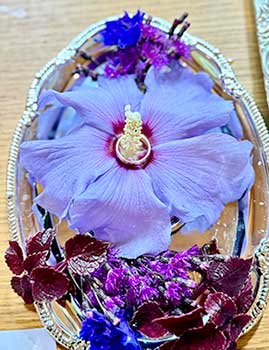 There was another war time example I saw, a very different type of “casta libertas”, this time, in a military context. We are currently reading a book about General Patton called Patton’s Prayer, a True Story of Courage, Faith and Victory. General Patton was, as he stated himself, a “genius”, but he was also a man of deep faith and he knew that even he needed God’s help to secure victory. And so there came a critical moment, when his army were under siege in Bastogne, and defeat seemed a real possibility, Patton knew exactly what his next tactic should be—he ordered his men to pray. Patton knew with utter confidence that between the two of them, God and Patton, victory would be theirs. And so it happened. That to me is also an example of casta libertas, because it was that complete faith in God that gave him the audacity and, I think, purity of intention, to go on to victory—he trusted that even within the fog of war, he knew what he was doing was right and, and, as with Lady Abbess, he could act with the daring freedom that gave him. There was another war time example I saw, a very different type of “casta libertas”, this time, in a military context. We are currently reading a book about General Patton called Patton’s Prayer, a True Story of Courage, Faith and Victory. General Patton was, as he stated himself, a “genius”, but he was also a man of deep faith and he knew that even he needed God’s help to secure victory. And so there came a critical moment, when his army were under siege in Bastogne, and defeat seemed a real possibility, Patton knew exactly what his next tactic should be—he ordered his men to pray. Patton knew with utter confidence that between the two of them, God and Patton, victory would be theirs. And so it happened. That to me is also an example of casta libertas, because it was that complete faith in God that gave him the audacity and, I think, purity of intention, to go on to victory—he trusted that even within the fog of war, he knew what he was doing was right and, and, as with Lady Abbess, he could act with the daring freedom that gave him.A final connection. When Lady Abbess saw General Patton’s Third Army come to liberate Jouarre on August 27th, she wrote that what struck her most about the Army was not the thrill of victory, but the cost of the victory; the exhaustion and suffering of each soldier: “They were just so sunburned and so exhausted, and their khaki uniforms were so dust covered. That really hit me hard”. We know that it was this moment that she felt the need to respond to the self-sacrifice of the American soldiers suffering by founding a contemplative monastery in America. This free response in love, when she knowingly took on a commitment of sacrifice is surely the ultimate expression of consecrated life. It was a moment of almost spousal covenant and on a personal note, I am not surprised that the American soldier gave her a packet of that quintessentially American candy, Lifesavers (quite a claim and in this case, true), and why our Abbess sent back that ultimate expression of betrothing love, the rose. 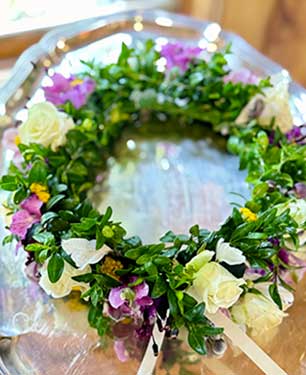 Which brings us to the present, when just 10 days ago, our Consecrated nuns wore crowns of roses, symbols of their consecration, and so we have come full circle. Which brings us to the present, when just 10 days ago, our Consecrated nuns wore crowns of roses, symbols of their consecration, and so we have come full circle.Lady Abbess would always draw on this experience of actual war and saw monastic life, as did St. Benedict, in terms of war, of a spiritual warfare that is waged in the monastery, with comparable sacrifices required. And so in line with that she saw the consecration of a nun in this light—a joyful day celebrating a transcendent spousal union, but also one that required a sacrifice, which she described in a way that echoes what she saw that day in Jouarre: “They put their bodies on the line in this merging with Christ and Christ becomes incarnated—becomes flesh in them.” So two ceremonies—consecration and liberation—one after the other—that perhaps share an expression of liberty, interior and exterior. Both demand a pledge of love and self-sacrifice freely given. Perhaps then everything is connected: out of war comes consecration, the battles that were fought on field then are the same battles against Principalities of darkness that we fight here in our monastery, and everything is of a piece and is drawn forward in divine love. THE ANNIVERSARY OF THE LIBERATION OF THE ABBEY OF JOUARRE, August 27, 2022 REFLECTION ON GENERAL PATTON AND PRAYER OFFERED BY MOTHER ABBESS LUCIA 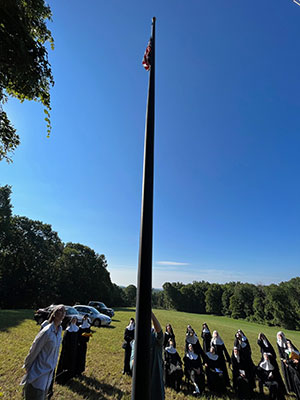 We are here today to commemorate that day in 1944 when Mother Benedict Duss saw from the window of the monastery Tower at Jouarre that an army of unknown origin was steadily advancing and that Liberation from the forces that held France in a grip of terror was at last at hand. Only later did she learn that those men belonged to the Third Army under the command of General George S Patton, Jr. and only a long time after that did she learn that the granddaughter of General Patton had mysteriously found her way to Regina Laudis. Furthermore, one day the circle would be complete and Margaret Patton would ask to give her life in service to fight for the Kingdom of Christ under the Rule of St. Benedict and the leadership of Lady Abbess. Far too many coincidences to be coincidence. We are here today to commemorate that day in 1944 when Mother Benedict Duss saw from the window of the monastery Tower at Jouarre that an army of unknown origin was steadily advancing and that Liberation from the forces that held France in a grip of terror was at last at hand. Only later did she learn that those men belonged to the Third Army under the command of General George S Patton, Jr. and only a long time after that did she learn that the granddaughter of General Patton had mysteriously found her way to Regina Laudis. Furthermore, one day the circle would be complete and Margaret Patton would ask to give her life in service to fight for the Kingdom of Christ under the Rule of St. Benedict and the leadership of Lady Abbess. Far too many coincidences to be coincidence.There is much to meditate on and learn from in this story but this year I want to accent one thing in particular and that is that General Patton was a man of prayer, intense prayer. It was his belief that ultimately prayer won the war. I want to thank Fr. Jack for his words about St. Monica at Mass this morning: without St. Monica’s prayers there would most likely be no St. Augustine. And I believe it was this hidden aspect of who General Patton was that at least in part, drew Lady Abbess to him with such fierce dedication. They shared a contemplative understanding of what it takes to battle the forces of Principalities and Powers. 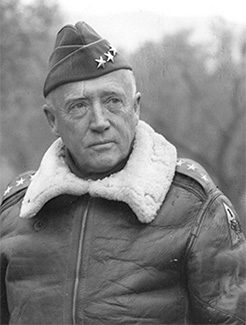 Many people perhaps know the story of the weather prayer, how on the eve of the battle of Bastogne, when the army was stalled by continuous rain General Patton ordered his chaplain, Msgr. James H. O’Neill to write a prayer for fair weather and distribute 250,000 copies so that every man in the Third Army would have one and would pray that prayer. General Patton was not at all surprised by the outcome, the skies cleared by Christmas, the planes could fly again, and the army could move on to victory. Many people perhaps know the story of the weather prayer, how on the eve of the battle of Bastogne, when the army was stalled by continuous rain General Patton ordered his chaplain, Msgr. James H. O’Neill to write a prayer for fair weather and distribute 250,000 copies so that every man in the Third Army would have one and would pray that prayer. General Patton was not at all surprised by the outcome, the skies cleared by Christmas, the planes could fly again, and the army could move on to victory.I think General Patton’s meditation on the importance of prayer that he shared with his Chaplain at that time speaks urgently and eloquently to our own present moment in time, when we face a world again at war, and a host of desperate situations of every kind confront us personally and globally every day. And so, before we raise the flags today I simply want to share his thoughts as presented by his Chaplain to all the other army Chaplains at the time and urge everyone here to put these words into practice, never forgetting that we too are engaged in a battle we cannot afford to lose, and that prayer can save the world. Now I quote from General Patton to Monsignor James H. O’Neill: “Chaplain, I am a strong believer in prayer. There are three ways that men get what they want; by planning, by working, and by praying. Any great military operation takes careful planning, or thinking. Then you must have well-trained troops to carry it out; that’s working. But between the plan and the operation, there is always an unknown. That unknown spells defeat or victory, success or failure. It is the reaction of the actors to the ordeal when it actually comes. Some people call that getting the breaks; I call it God. God has His part, or margin in everything.
That’s where prayer comes in. Up to now, in the Third Army, God has been very good to us. We have never retreated; we have suffered no defeats, no famine, no epidemics. This is because a lot of people back home are praying for us. We were lucky in Africa, in Sicily, and in Italy, simply because people prayed. But we have to pray for ourselves, too. A good soldier is not made merely by making him think and work. There is something in every soldier that goes deeper than thinking or working–it’s his ‘guts.’ It is something that he has built in there: it is a world of truth and power that is higher than himself. Great living is not all output of thought and work. A man has to have intake as well. I don’t know what you call it, but I call it Religion, Prayer, or God….” 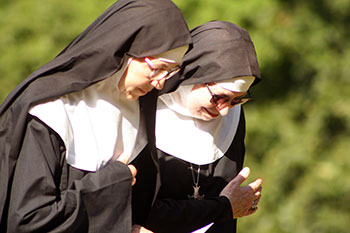 “Those who pray do more for the world than those who fight; and if the world goes from bad to worse, it is because there are more battles than prayers. ‘Hands lifted up,’ said Bossuet, ‘smash more battalions than hands that strike.’ Gideon of Bible fame was least in his father’s house. He came from Israel’s smallest tribe. But he was a mighty man of valor. His strength lay not in his military might, but in his recognition of God’s proper claims upon his life….” “Those who pray do more for the world than those who fight; and if the world goes from bad to worse, it is because there are more battles than prayers. ‘Hands lifted up,’ said Bossuet, ‘smash more battalions than hands that strike.’ Gideon of Bible fame was least in his father’s house. He came from Israel’s smallest tribe. But he was a mighty man of valor. His strength lay not in his military might, but in his recognition of God’s proper claims upon his life….”“Those who pray do more for the world than those who fight; and if the world goes from bad to worse, it is because there are more battles than prayers. ‘Hands lifted up,’ said Bossuet, ‘smash more battalions than hands that strike.’ Gideon of Bible fame was least in his father’s house. He came from Israel’s smallest tribe. But he was a mighty man of valor. His strength lay not in his military might, but in his recognition of God’s proper claims upon his life.”
REFLECTION BY MOTHER ELIZABETH, August 27, 2020 "GOOD TROUBLE/SAY THEIR NAMES"
The story of the Founding of Regina Laudis is the story of a community created out of war—yet, we know that in Christ, creation is on-going. We are constantly founding and re-founding our community, constantly contending with the principalities and powers of our time.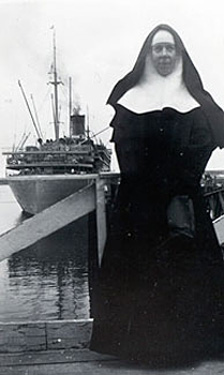 Through the past year we’ve seen that in a certain way, the world, and particularly our own nation, is at war—at war with a virus and the various responses of care and of indifference to the virus—Again and again in the past months here in this nation we have witnessed casual murder—committed right before the eyes of the entire world. Here in this country our streets are in flames, and our nation is polarized to a degree almost reminiscent of civil war. In this time of lockdown we take our place in the line of Lady Abbess’ vision from her own place of lockdown in 1944, and we participate in the on-going creation story of this community, to redeem—we could say “flip”—the narrative of casual indifference, violence and murder of our time, that has been our burden and privilege to witness. Through the past year we’ve seen that in a certain way, the world, and particularly our own nation, is at war—at war with a virus and the various responses of care and of indifference to the virus—Again and again in the past months here in this nation we have witnessed casual murder—committed right before the eyes of the entire world. Here in this country our streets are in flames, and our nation is polarized to a degree almost reminiscent of civil war. In this time of lockdown we take our place in the line of Lady Abbess’ vision from her own place of lockdown in 1944, and we participate in the on-going creation story of this community, to redeem—we could say “flip”—the narrative of casual indifference, violence and murder of our time, that has been our burden and privilege to witness.This difficult time—with its heightened focus on wearing masks—has paradoxically been a time of un-masking: there has been an unmasking of unresolved tensions and unredeemed situations, the unmasking of a “dark” spirit pervading our country, while also being a time of great generosity of spirit. We have to name it—what has been un-masked, and how can we, here in the community, redeem it—“flip” it—as Lady Abbess flipped the darkness of her time? First and foremost, we have to pray, and remember. We remember that daunting days have a way of un-masking hidden strengths—Among the cries echoing in our streets in these past months there are two in particular that I want to call attention to here, cries that can be our strength—cries that can guide us on the path of redemption of these times, if we allow ourselves to remember them: cries of Good Trouble and Say Their Names. We remember the words of John Lewis: Never, ever be afraid to make some noise and get into trouble—Necessary Trouble. Good Trouble. In other words, we have the power to “flip” the trouble we are witnessing in these days, and transform it into a redemptive struggle for good.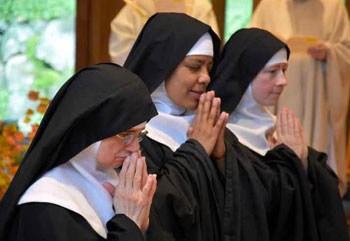 We remember the righteous rage of demonstrators in our streets, making their noise, making lots of trouble, challenging us never to forget, but to Say. Their. Names. We remember the righteous rage of demonstrators in our streets, making their noise, making lots of trouble, challenging us never to forget, but to Say. Their. Names.So—we ask: where do we, here at the Abbey—“flip” the noise permeating the airwaves in these days, where on this land are we making Necessary Noise and Good Trouble? In this noisy election season we remember that the most efficacious vote we can cast, one that is guaranteed to be delivered and counted, is our vota—our monastic vows—to God through this community, this land. This “noisy” summer has un-masked the reality that our darkness matters, and it confronts us with a choice—We can relate to that darkness by projecting it onto others, as a Shadow to be quashed, choking the life out of it, as we have seen in too many news reports in these days. Or we can relate to our darkness as guide and light ( let your darkness be your light ). But either way, it’s clearer than ever before that our individual and communal darkness shapes and forms us—in other words, we live the reality that darkness matters. It is a moment to ponder whether our way of integrating our darkness may have been the formative catalyst for a woman of color being named as a running mate in this year’s election.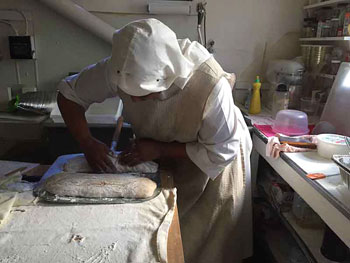 Among the many realities unmasked in this time, something that the stubborn resistance to virus protocols will tell you, is that humans are not good at isolation: we’re wired for relationship and, here at the Abbey, Benedictine hospitality. Our Marian witness to the liberating power of a contemplative, hidden and “intensely operative” way of life, on a line with Lady Abbess’ own hidden operative life in the lockdown she endured, continues to draw young women today to explore the internship and their own call to contemplative life. Among the many realities unmasked in this time, something that the stubborn resistance to virus protocols will tell you, is that humans are not good at isolation: we’re wired for relationship and, here at the Abbey, Benedictine hospitality. Our Marian witness to the liberating power of a contemplative, hidden and “intensely operative” way of life, on a line with Lady Abbess’ own hidden operative life in the lockdown she endured, continues to draw young women today to explore the internship and their own call to contemplative life.
This has been our war story, this is our creation story, this is our particular liberation story in this strange, dark year. May the Holy Spirit strengthen us to keep taking our place in Lady Abbess’ vision—whether what we’re doing is singing the Office, cleaning the bathrooms, moving mountains of laundry, baking bread, turning the compost pile, or bringing in the hay—Our place is in this ever-unfolding story of liberation on this land, in this community. In thanksgiving for this story and for our place in it, Let us pray to the Lord. COMMEMORATION OF THE 75TH ANNIVERSARY OF THE LIBERATION OF THE ABBEY OF JOUARRE, August 27, 2019 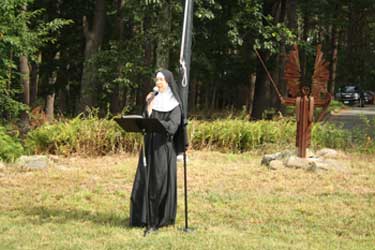 On August 27th under the gaze and protection of St. Michael the Archangel, the community and guests gathered in St. Pius hay field for a ceremony commemorating the 75th anniversary of the Liberation of the Abbey of Notre Dame de Jouarre. Mother Subprioress Margaret Georgina Patton welcomed our veterans and guests and reminded those present that this anniversary marks the day Regina Laudis was conceived. It was on this date in 1944 that our foundress Mother Benedict Duss, with her monastic Community, the Abbey of Jouarre, was liberated by the American Third Army. On August 27th under the gaze and protection of St. Michael the Archangel, the community and guests gathered in St. Pius hay field for a ceremony commemorating the 75th anniversary of the Liberation of the Abbey of Notre Dame de Jouarre. Mother Subprioress Margaret Georgina Patton welcomed our veterans and guests and reminded those present that this anniversary marks the day Regina Laudis was conceived. It was on this date in 1944 that our foundress Mother Benedict Duss, with her monastic Community, the Abbey of Jouarre, was liberated by the American Third Army. As a member of that French Abbey in occupied France, she had been under Nazi oppression for years, even at one point with an SS unit living within the Abbey itself. On this particular day, word reached the Abbey that there were more Nazi forces advancing toward the village. Mother Benedict felt sure that, on the contrary, the approaching force was the Allies. Though quite ill at the time she climbed the 11th century tower to see for herself. What she saw was the five point star on the first vehicle, and then an American flag unfurled. Indeed it was the Allies, and as she later discovered, the 3rd Army. In that moment she knew a call to respond to this act of liberation by bringing monastic life as she knew it to her country of origin, the United States of America. Despite countless hurdles, she never wavered from this vision, and two years later, Regina Laudis Monastery was founded. We are privileged to be here because of that vision, and because she and her co-Foundress Mother Mary Aline persevered despite countless obstacles. 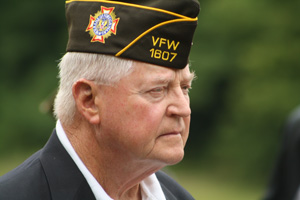 Mother Subprioress acknowledged the veterans and family members of veterans present for the flag raising ceremony:
the late Salvatore D’Amico, WWII veteran, 3rd Army, father of Mary Corsu (present), veteran John Chang and wife Sally, Bill Deluca, WWII veteran, Nick DeCerbo, WWII veteran, 3rd Army,
Ronnie Maebry, veteran and current State Commander of Disabled American Veterans, Mary Riss veteran who turned 100 this year, Jim Rodgers, WWII veteran of the Normandy invasion, John Carabetta, Vietnam veteran, Ken Corsu, Vietnam veteran, Al Yagovane, Commander of VFW in Seymour. Not present but acknowledged were: Sam Derene, 1st Armored Brigade combat team, 3rd Infantry Division and Joseph Heldrich, former monastic Intern, both having recently completed basic training for military service. Mother Subprioress acknowledged the veterans and family members of veterans present for the flag raising ceremony:
the late Salvatore D’Amico, WWII veteran, 3rd Army, father of Mary Corsu (present), veteran John Chang and wife Sally, Bill Deluca, WWII veteran, Nick DeCerbo, WWII veteran, 3rd Army,
Ronnie Maebry, veteran and current State Commander of Disabled American Veterans, Mary Riss veteran who turned 100 this year, Jim Rodgers, WWII veteran of the Normandy invasion, John Carabetta, Vietnam veteran, Ken Corsu, Vietnam veteran, Al Yagovane, Commander of VFW in Seymour. Not present but acknowledged were: Sam Derene, 1st Armored Brigade combat team, 3rd Infantry Division and Joseph Heldrich, former monastic Intern, both having recently completed basic training for military service.Mother Subprioress introduced two special women, both nurses, who have been deeply touched by war and have chosen to give their lives in service. 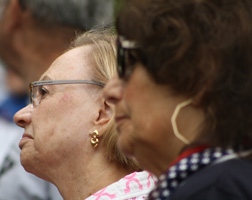 Captain Karen Trueblood served in the Iraq war, commanding the US Marines 4th Medical Battalion and since retirement has continued to serve her fellow soldiers and sailors, especially the homeless veterans and their families. Karen could not be present in person, but was grateful to have a Navy man present her message. Ron Gregory, himself a Navy Fireman who participated in the mission of the recovery of Apollo 7 in 1968, graciously accepted to give voice to Karen’s words. 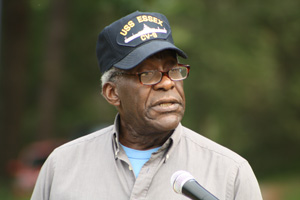 We tend to forget the scores of men and women whose futures were lost so the next generation’s futures could be won. For over 200 years, we have had American men and women give the last full measure of devotion to preserve our freedom and help others be free. Just like those in the 3rd Army that liberated Jouarre, other service members stepped up and today continue to step forward to give of themselves so those that come after them have the opportunity to accomplish their dreams and live in freedom. We tend to forget the scores of men and women whose futures were lost so the next generation’s futures could be won. For over 200 years, we have had American men and women give the last full measure of devotion to preserve our freedom and help others be free. Just like those in the 3rd Army that liberated Jouarre, other service members stepped up and today continue to step forward to give of themselves so those that come after them have the opportunity to accomplish their dreams and live in freedom. Serving others doesn’t require joining the military or a big budget, a large staff and volunteers, a media plan and kick off campaign. It starts simply with just you. It can be as simple as taking your elderly neighbor’s trash can to the curb each week, picking up a newspaper tossed at the end of a driveway and placing it on the front porch, visiting a nursing home, writing a letter or sending a card to a VA hospital or local hospice, or helping put groceries in a car. Can you volunteer at a school to read to a kindergarten class, can you drive someone to a doctor’s appointment or church? Just one small kindness can have a big impact. Captain Karen Trueblood, Commander, US Marines 4th Medical Battalion, Iraq
Read and/or download a pdf file of the full text of Captain Karen Trueblood's address. The raising of the American and Vatican flags was followed by the Pledge of Allegiance the National Anthem and the singing of the hymn to Our Lady, the Salve Regina. Father Robert Tucker gave the Final Blessing. Gallery of the Commemoration of the Liberation of Jouarre 2019
Every August 27th we commemorate the liberation of the Abbey of Notre Dame de Jouarre by the American 3rd Army in 1944. This was the day our Foundress, Mother Benedict Duss, an American citizen and surgeon, was inspired to come to the United States to establish a Benedictine monastery in gratitude to the Allies who liberated France. 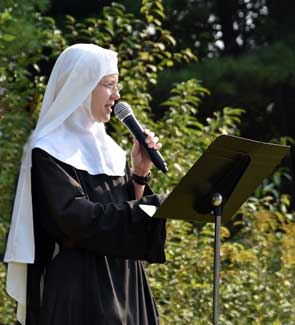 This renovation represents our commitment to monastic life going forward, to being a contemplative Benedictine community rooted in Bethlehem, Connecticut, USA, for the ages to come. In that light, she introduced Sister John Mary Adshead, one of our community members in first vows. Sister John Mary was born in New Zealand; her parents were English and she was educated in England. She has lived in the United States for over twenty years, ten in New York City and ten here at Regina Laudis. This year in May she decided to apply for US citizenship and her application is now in process, pending her interview later this year and passing her civics test. Sister John Mary made a moving presentation of why she wanted to become an American at this particular time.Out of making those Vows has come a desire to become an American citizen—a kind of fourth vow, expanding this heartfelt commitment beyond the members of this Community, to the people of this country, and to them, I am profoundly grateful. When I arrived here twenty years ago seeking more opportunities, I was struck by people’s warmth and generosity. I was welcomed into homes across America: from San Francisco to Sanibel Island, from Freeport, Maine to Memphis. No one ever let me spend Thanksgiving alone in my apartment—I was always one more person an American family could make room for. I have been reading a lot of biographies of the Founding Fathers recently, and as I delve into this country’s history, I see that this generosity of spirit, these values were there at the inception of this nation, that they are intrinsic to the country, to its constitution, and that I believe is still part of the American way.
Sister John Mary Adshead O.S.B., Why I am becoming an American citizen, August 27, 2018
Read and/or download a pdf file of the full text of Sister John Mary's speech: Why I am Becoming an American Citizen. 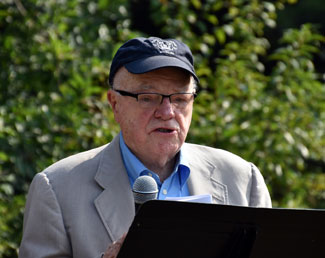
Eternal God, we praise you for your wondrous deeds and thank you for all your gifts to us. We bow before your magnificent glory and we humbly ask you to hear us. In your tender compassion oh Lord, the dawn from on high broke upon Jouarre 74 years ago and you freed the Abbey from its enemies by your power given to your servant, General George Patton and his army. The people could now worship God without fear or according to the Rule of St. Benedict as they wished. Just as importantly, the opportunity was now there for Sister Benedict to follow her longing and establish an Abbey of Benedictines in the United States. The Holy Spirit now moved her in that direction.
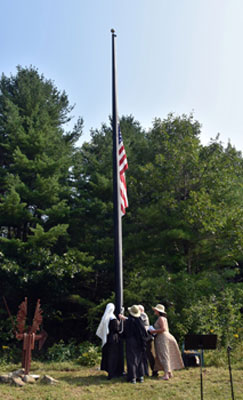 We thank God and pray for the support group Sister Benedict assembled and all her efforts to do so. We thank God and pray for the support group Sister Benedict assembled and all her efforts to do so.We thank God for the founders of Regina Laudis, “the living stones” of happy memory who have become the foundation of the Abbey upon which all else is built both since and today. We thank you Lord for the particular insight Sister John Mary has given us today. Love of God and his people and the evident joy that comes from that life commitment. We pray for the completion of the new buildings and may the Sisters be ever happy there. We ask you Lord for new postulants and “living stones”, and health and well being for our present sisters. Aside from this occasion we pray for our Church—all of us, not just the ones who persevere in prayer. The Church is more and more under siege and somewhat in the hands of our enemies. We must work harder to renew it. Finally Lord, put us on the path of God the Father and His heavenly abode, guide us while life shall last. Remove from our hearts all that is not holy and all that is not true. As we pass through the dark valleys and rough spots in this world, let your words be a light for our steps and a lantern for our path until you show us the gates of heaven.
Prayer by Jim Rogers, World War II Veteran, August 27, 2018 The raising of the flags was followed by the Pledge of Allegiance the National Anthem and the singing of the hymn to Our Lady, the Salve Regina. Father Iain Highet gave the Final Blessing. Gallery of the Commemoration of the Liberation of Jouarre 2018
Our world is in turmoil. Our military is challenged from within and without. Our culture seems in many ways adrift, having lost its moorings. But there is so much good, and the spirit of self-sacrifice is in evidence everywhere if we look for it. That we are here today with you, witnesses to the truth that 'greater love hath no man than to lay down his life for his friends'.
Mother Subprioress Margaret Georgina Patton  On August 27, 2017 we celebrated the 73rd anniversary of the day in World War II that the Allied forces liberated the small French village of La Ferte sous Jouarre, and with it the ancient Abbey of Notre Dame de Jouarre. Jouarre had been occupied by the SS and Mother Benedict Duss, an American citizen and surgeon, had been in hiding for years inside the monastery. The act of Liberation by the American 3rd Army inspired her to make a monastic foundation in the United States. On August 27, 2017 we celebrated the 73rd anniversary of the day in World War II that the Allied forces liberated the small French village of La Ferte sous Jouarre, and with it the ancient Abbey of Notre Dame de Jouarre. Jouarre had been occupied by the SS and Mother Benedict Duss, an American citizen and surgeon, had been in hiding for years inside the monastery. The act of Liberation by the American 3rd Army inspired her to make a monastic foundation in the United States.On this clear sunny day our Subprioress, Mother Margaret Georgina Patton, granddaughter of General George S. Patton Jr., welcomed active service members, veterans and many relatives of veterans including mothers, wives, children, and grandchildren. The veterans present have served in several wars, including World War II, Korea, Vietnam, Afghanistan, Iraq and the Gulf War. Mother Subprioress presented the accent of this year's ceremony as "Dedication in Service" highlighting those who support and care for our veterans. In recent times, because of many converging circumstances: multiple deployments, advances in medicine that make healing possible, widespread terrorism all over the world, we are faced with the seemingly limitless need for healing and assistance of every kind in our returning veterans. Two of our invited speakers have given their lives in service, particularly in support of active military members, veterans, and military families. 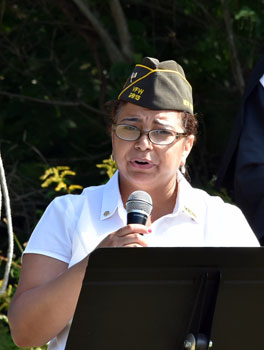 Luz Fernandez-Aviles, sister of our own Sister Maria Evangelista Fernandez, is a Gulf War veteran who served for 9 years in the US Army reserves. She was deployed in Riyadh, Saudi Arabia where she worked as a Petroleum Supply Specialist. She has received many awards and accolades for her service in the military. Some of these include the Army Commendation Medal, Certificate of Achievement, the Army Achievement Medal, New York State Assembly Citation, and the New York State Senate Liberty Award. Luz Fernandez-Aviles, sister of our own Sister Maria Evangelista Fernandez, is a Gulf War veteran who served for 9 years in the US Army reserves. She was deployed in Riyadh, Saudi Arabia where she worked as a Petroleum Supply Specialist. She has received many awards and accolades for her service in the military. Some of these include the Army Commendation Medal, Certificate of Achievement, the Army Achievement Medal, New York State Assembly Citation, and the New York State Senate Liberty Award.Luz works with the Veterans of Foreign Wars and hopes in the future she can continue assisting the younger generation of veterans. Her love of family and people is one of her best qualities and is what keeps her motivated in finding ways to better the lives of those around her. Luz was inducted this year into the New York State Senate Veterans Hall of Fame. The VFW is based on camaraderie. It is Veterans helping other Veterans and their family members. The VFW gives you the freedom to be able to express yourself and be understood in ways that only another Veteran could understand. It’s a place to heal and move forward. In the future I hope to be able to invite Veterans of all generations to join us and share with them how having faith in God can heal and free us from the wounds we cannot see.
Luz Fernandez-Aviles, Gulf War Army veteran, member of the VFW Post 2813, Woodside, NY In Luz' moving speech she bore witness to her deep Faith in God, telling us that during her deployment, her parents, siblings, relatives and friends were praying for her. And during all the time I spent there, I can honestly say that I was never afraid. I had a sense of Peace in a time of war. I truly felt as if God himself came to me and said 'Fear not, for I am with you'. The whole time I was there, I felt protected, as if I had an Army of Angels watching over me. 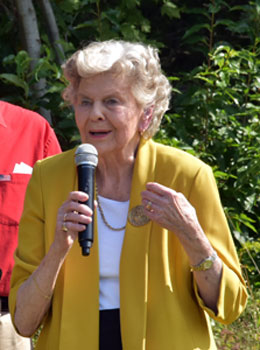 Another honored guest was the mother of Mother Subprioress, Joanne Holbrook Patton, widow of General George Patton. Joanne was accompanied by her sister, Marni Holbrook Roberson. Their father, Brigadier General Willard Holbrook served in WWII, liberating the Austrian city of Linz without a shot. Marni is also the recent widow of Vietnam veteran Robby Roberson. Another honored guest was the mother of Mother Subprioress, Joanne Holbrook Patton, widow of General George Patton. Joanne was accompanied by her sister, Marni Holbrook Roberson. Their father, Brigadier General Willard Holbrook served in WWII, liberating the Austrian city of Linz without a shot. Marni is also the recent widow of Vietnam veteran Robby Roberson.Joanne Patton has worked tirelessly with various groups supporting military families, in particular the National Military Family Association, which has named a scholarship in her honor and Operation Troop Support. She advocates tirelessly through her membership in various service organizations for persons with disabilities, including veterans. Joanne embodies the strength of an "army wife" having providing stability for her five children during her husband's tours of duty in Korea and Vietnam. With her characteristic humility and grace, she recounted how she discovered that other military spouses needed to talk and through the simple gesture of an invitation to tea, allowed them to share their burdens. She urged each of us to find a way to serve, be it as simple as lending an ear and offering a word of support. 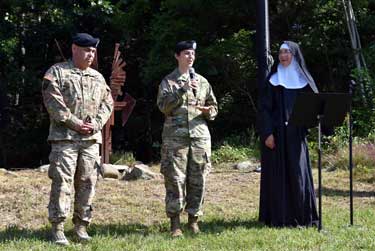 We were pleasantly surprised and honored with the presence of two active Army Officers, Lt. Colonel P. Anela Arcari and her colleague, Colonel Eloy Cuevas, dressed in their Army Combat Uniforms. Anela is the daughter of Patty and Lt. Colonel (Ret.) Joseph Arcari, relatives of Mother Noella. Anela serves as an Engineer Officer at Fort Belvoir, VA and is proud to have served twice in "Patton's Own" 3rd Army in Kuwait from 2003-2004 and 2015-2016. Colonel Cuevas is a Military Intelligence Officer, Deputy G2, stationed at Shaw Air Force Base, SC, and is presently serving in the 3rd Army. Both proudly pointed out their US Army Central (3rd Army) Combat Service Identification Badges. We were pleasantly surprised and honored with the presence of two active Army Officers, Lt. Colonel P. Anela Arcari and her colleague, Colonel Eloy Cuevas, dressed in their Army Combat Uniforms. Anela is the daughter of Patty and Lt. Colonel (Ret.) Joseph Arcari, relatives of Mother Noella. Anela serves as an Engineer Officer at Fort Belvoir, VA and is proud to have served twice in "Patton's Own" 3rd Army in Kuwait from 2003-2004 and 2015-2016. Colonel Cuevas is a Military Intelligence Officer, Deputy G2, stationed at Shaw Air Force Base, SC, and is presently serving in the 3rd Army. Both proudly pointed out their US Army Central (3rd Army) Combat Service Identification Badges. 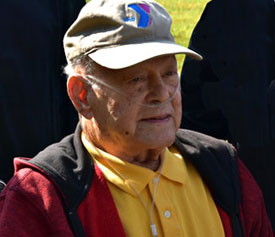 Luz Fernandez-Aviles raised the American flag with Mother Alma Egger. The flag belonged to Mother Alma's recently deceased father, Fred, himself a veteran. LTC Anela Arcari and Colonel Eloy Cuevas raised the Vatican flag. To honor the men and women who risked and gave their lives for the original liberation of Jouarre in 1944, and veterans and the families present, we said the Pledge of Allegiance, followed by the National Anthem. In singing the Salve Regina, we placed the ongoing work of Liberation of peoples and lands in the hands of Our Lady, with this heartfelt prayer of Mother Subprioress Margaret Georgina Patton: We hope that Regina Laudis will always be a beacon of hope both for those suffering the effects of war and combat of whatever kind, and for those who are called to assist in the healing, rehabilitation, or restoration process.
Gallery of the Commemoration of the Liberation of Jouarre 2017
|
||||||||||||||||||||||||||||||||||||||||||||||||||||||||||||||||||||||
| Copyright © 2013 Abbey of Regina Laudis. All rights reserved. | |||||||||||||||||||||||||||||||||||||||||||||||||||||||||||||||||||||||